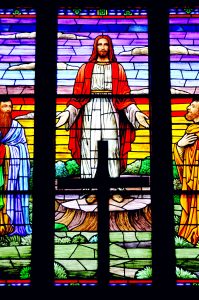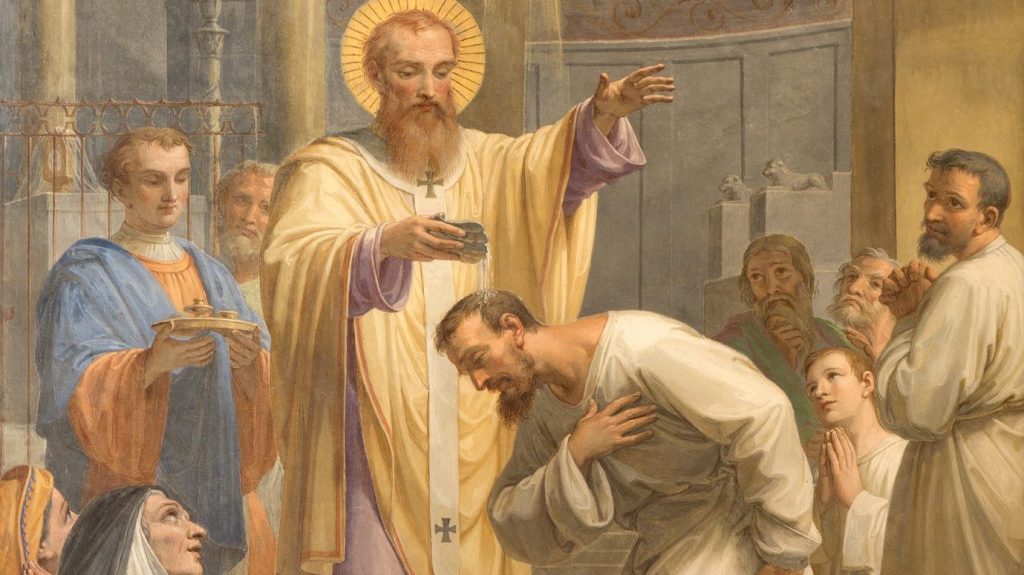If we are honest with ourselves, we fear Jesus’ command to be perfect as our heavenly Father is perfect. We fear it because we know it is not in our power.
Still, we long for self-improvement. We make resolutions every New Year’s about losing weight, reading the Bible more, finally learning Spanish. We perceive, even if through a glass darkly, that we are not as we should be. In our effort to rectify these frustrating maladies, we turn to self-love, self-care, or self-help. But our efforts don’t work, not for our lack of trying, but because of who we are, how we have been made, and from where our help comes.
Ever since the fall of Adam and Eve, we have been experiencing this disintegrated self, this war of two wills, as St. Augustine describes it in his “Confessions.”
St. Augustine opens the “Confessions” with a prayer: “In yourself, you rouse us, giving us delight in glorifying you, because you made us with yourself as our goal, and our heart is restless until it rests in you.”
In one sentence, St. Augustine simplifies our entire restlessness.
We are all called to be saints. “The only real sadness, the only real failure, the only great tragedy in life, is not to become a saint,” French novelist Léon Bloy famously wrote. Holiness is a call to be not of this world, but to be set apart for the next one.
God has called his people to be holy, as overwhelming as it might seem. But we should find it reassuring that our sanctification does not occur under our direction. Holiness is not a list of tasks for us to accomplish; it is God’s work. Our perfection depends, not on us, but on God. His grace refines our nature, calling us to convert our desires into his, to change our likeness to reflect his.
Colleen Carroll Campbell subtitled her recent book on holiness, “How the Saints Taught Me to Trade My Dream of Perfect for God’s.” She writes, “Christian perfection is not just different from perfectionism. It’s diametrically opposed.”
We are not responsible for perfecting ourselves, so we need not stock our shelves with self-improvement books in this endless and disquieting quest to make ourselves into who we think God wants us to be. Sanctification is when God works on us. We cannot fake it or check enough boxes to make it happen.

The truth is that we are not the first human beings to attempt to be holy, nor will we be the last. The call to sanctity is meant for all of us, and we can be uplifted by stories of others who lived and died faithfully. St. Paul writes in Romans, “We can be encouraged by the faithfulness we find in each other, both your faithfulness and mine.”
While “all God’s children are his saints,” the theologian James William McClendon writes, in the sainthood we share through Jesus Christ, “we are to be strengthened by one another’s faith.” Reading others’ stories will increase our faith by surrounding us with a community of faithful followers, what the Letter to the Hebrews calls the “great cloud of witnesses.”
“Following” is the main directive that Jesus gives to us in this journey to perfection. When the rich young man asks him what else he should do in addition to adhering to all of the commandments of God’s law, Jesus replies: “If you want to be perfect … follow me.” Rather than a sequel to the Ten Commandments, the New Testament offers Christians the story of how Jesus embodied obedience to God and invites us to imitate his life.
When Jesus commands, “Follow me!” he is saying “both what you should do and how you should do it,” according to the biblical scholar, N.T. Wright.
Here Jesus extends far beyond the Pharisees’ legalism or Aristotle’s virtuous road to happiness.
“Jesus is challenging the young man to a transformation of character,” Wright explains, adding, “You can divide theories about human behavior into two: either you obey rules imposed from the outside, or you discover the deepest longings of your own heart and try to go with them.”
On the one hand, legalism. On the other hand, Disney’s “follow your dream.” What Jesus is commanding is something radically different: to follow him.
While our knowledge of who Christ is should come first from the Bible, most of us received our faith from persons in our lives who live out the Gospel and shared it with us. Our sanctification happens within the Church, the living body of Christ. We imitate those lives that surround us, so our sanctification may be encouraged by the company we keep, the models we choose to follow.
While the hair on our neck may prickle at the notion of “imitating,” we have never done anything but imitate. The idea of absolute originality is a lie. Think of how you learned a language (rather than invent one), how you decide what foods you like, what college football team you support, what you enjoy wearing or what hobbies you take up.
The reality is that we all have models, whether or not we realize it. To draw on the philosophy of the French historian René Girard, human beings are “mimetic” creatures. Girard discovered this idea of mimesis by reading novels, but his idea is biblical. If we do not choose whom to imitate, we will slavishly follow someone or something without recognizing it.
Every culture has heroes; every culture chooses whom to remember and whom to revere. In 21st-century America, we exalt political leaders, even sometimes to the point of worship. We read more stories about celebrities we will never meet and whose ethics are as loosely defined as the majority of the secular world.
Each year, we gorge on films meant to make us feel for the victories or defeats of superheroes, without reflecting on whether these figures display eternal verities.
If the Church decides not to uplift saints, its members will worship the alternative heroes offered by culture. Our impulse to exalt or imitate others will not be lessened, even if we choose to neglect the saints. Either we model saints, or we will unwittingly imitate the substitutes offered by this world.
That is because imitation is written into reality, and it has been since God created us as a reflection of his image. In Genesis, we read, “God created human beings in his image.” The dust that was fashioned into our humanity was crafted according to a particular mold.
After the fall, when this shape becomes distorted, God descends as Jesus Christ to show us our rightful image. The incarnate God asks us to follow him, to do what he does, to live like he lives. His disciples imitate him, which is what makes them disciples.
We cannot concoct holiness on our own, decide what it looks like without examples, or try to become holy without other people. The goal, as the saints know, is to be remade into his likeness.
Rather than work without success to be wholly original, we should practice becoming what we were always meant to be — holy unoriginal — in imitation of the God who is our origin and will ever be our end.

